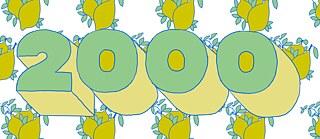“Wenn ich ein Turnschuh wär” by Die Goldenen Zitronen from 2005 pre-dates the massive migration movements of 2015, which became known as the Refugee Crisis, by a whole ten years.
Soundtracks
With eight German-language songs from eight decades, music journalist Mario Lasar sheds some light on important cultural and social phenomena in (West) German post-war history.
Most of the songs and artists mentioned in this series can be listened to (in order of mention) in a Spotify playlist: open.spotify.com/playlist/soundtracksBRD/
Wenn ich ein Turnschuh wär is musically based on a sluggish but precise beat, which is complemented by an oscillating, unstable sequencer run. The arrangement’s minimal approach is reminiscent of Ich und die Wirklichkeit (Me and Reality) by NDW band Deutsch Amerikanische Freundschaft, otherwise known as DAF. Both tracks express a state of crisis. An ornamented, decidedly alien vocal style reflects the moment of alienation that dominates the subjects in the song.
Gäb’ ich meine letzten Mittel her, Mittel her, Mittel her
Und es zieht mich weil ich dringend muss, dringend muss, dringend muss
Immer über den Bosporus, Bosporus, Bosporus
Literal translation:
Yes, for a trip to the Mediterranean, Mediterranean, Mediterranean
I’d give my last money, money, money
And I’m attracted to it because I urgently must, urgently must, urgently must
The track by the Zitronen is brought to life in particular by the fact that the vocals switch register in an abrupt, exaggerated manner, which is suggestive of role-play. Despite the first-person singular, the song uses this device to install a productive distance from its subject. The view of the outlined scenario is thus rather sober and not clouded by passive sentimentality.
In specific terms, the track creates a situation that addresses the privileges enjoyed by commodities in relation to people when it comes to crossing borders:
käm ich, wenn ich ein Turnschuh wärʼ
oder auch als Flachbildscheiß
ich hätte wenigstens einen Preis.
Literal translation:
I’d get across your shitty Mediterranean
if I were a sneaker
or even some rubbish flat-screen TV
at least I would have a price.
The narrator projects himself into the character of a commodity without wanting to be a commodity. At the end of the song the lyric says: “Komm gib mir deine Hand / denn heute feiern wir” (I wanna hold your hand / for today we’re celebrating), whereby the first line is a Beatles quote and the second is once again sung in a disguised voice. A polyphony emerges that tries to capture the complexity of reality. So Die Goldenen Zitronen have departed significantly from the one-dimensionality of traditional “protest songs”.
Wenn ich ein Turnschuh wär is also an important track from another aspect: it establishes an implicit connection between goods produced cheaply outside Europe on the basis of exploitation and the cynical degradation of non-European people.
Today, circumstances have changed in that refugees also have a value, albeit a negative one. So-called third countries such as Turkey or Jordan receive substantial payments from the European Union for taking in refugees. The political scientist Gerasimos Tsourapas speaks here of the “commodification of refugees”“ by which he means the increasing transformation of refugees into commodities that are subject to market laws negotiated between the EU and the Global South. The tendency here is for human rights to be ignored. The conflation of refugees and goods, which still seems grotesquely exaggerated in the song by Die Goldenen Zitronen, has sadly become reality today.
An acquaintance from Belgrade who came to Germany to study once expressed to me her complete incomprehension of the fact that Die Goldenen Zitronen do not enjoy the same status as Die Toten Hosen or Die Ärzte. When she first came across the band, she thought that they would be part of the general cultural heritage in this country. Anyone who has heard Wenn ich ein Turnschuh wär will understand what she means.
Soundtracks
- 1950s: Just don’t overdo it with the freedom! (Fred Bertelmann – "Der lachende Vagabund")
- 1960s: A poetic moral portrait of class society (Franz Josef Degenhardt – "Spiel nicht mit den Schmuddelkindern")
- 1970s: An unusual alliance between green politics and Schlager hits (Udo Jürgens – "Tausend Jahre sind ein Tag")
- 1980s: Concrete and neon lights (Joachim Witt – "Der Goldene Reiter")
- 1990s: Of new possibilities (Blumfeld – "Tausend Tränen Tief")
- 2000s: When things are worth more than people (Die Goldenen Zitronen – „Wenn ich ein Turnschuh wär“)
- 2010s: Great cinema? (Helene Fischer – "Atemlos durch die Nacht")
- 2020s: A new power structure of gender roles (Christin Nichols – "Bodycount")
The publication of this article is part of PERSPECTIVES - the new label for independent, constructive, multi-perspective journalism. >>> To know more about PERSPECTIVES
05/2024
